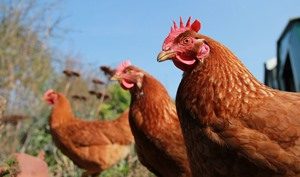Nothing better than fresh eggs!
Keeping poultry can be a great way to recycle vege scraps and get some lovely fresh eggs. However, keeping poultry comes with some responsibilities under Council’s Local Laws.
Roosters aren’t suitable for a suburban block. To keep a Rooster you need to be on at least a 1 hectare block.
To find out what you can and can’t keep on your sized allotment/property please click on the link:
 Schedule 2 And 3 Keeping Of Animals (1.0 MiB)
Schedule 2 And 3 Keeping Of Animals (1.0 MiB)
Minimum standards for keeping poultry (includes any species of chickens, geese, ducks, guinea fowls, turkeys, pheasants or quails).
1. Fowl houses, fowl pens and runs are not to be situated
(a) within 10 meters or a dwelling or place where food is kept processed or stored; and
(b) within 2 meters on any property boundary or a road.
2. Poultry food must be stored in a vermin proof receptacle
3. The bird/s kept without nuisance
4. The bird/s are contained within an aviary or cage of a suitable size to suit the types of bird/s. Must be built and maintained to prevent bird/s from escaping from the land onto the road.
5. Bird/s must be provided with adequate;
– shelter from the sun, wind and rain
– fresh food and water
6. Enclosure to be kept clean and sanitary, free from flies, rats, other vermin and nuisance odors.
Birds make noise for many reasons
- If the bird is bored or lonely
- When communicating with other birds (flying past etc)
- Unhappy or sick (often loud or in a repetitive pattern for a long time)
- Jealousy, a change of routine, or loss of a family member
- Some birds celebrate sunrise or sunset
- If there is danger, when afraid or to warn others of danger
What you can do to control your noisy bird
- Ensure the birds basic needs are met – food, water and toys.
- Provide alternatives for the bird to play and exercise, such as supervised out of the cage play, play gym or changing the toys in its cage.
- Provide the bird with noise like the TV or leaving the radio on.
- Provide natural alternatives – non toxic native plants, tree branches with leaves, or flowers for nectar eaters, and seed pods or nuts (ensure you research what you are providing to make sure it is not toxic)
- Hiding toys and food in places the bird has to search for it. Training and providing rewards helps mentally stimulate the bird.
- Do not pay attention to or reward bird when it is squawking.
- Praise the bird and positively reward it when it is behaving quietly
- Yelling, hitting the cage and spraying the bird with water etc can make things worse and lead to other issues.
- Loneliness can be helped by getting another bird OR it can makes things much worse and both birds screeching together.
Schedule 1 – Dictionary
Special birds includes emus and ostriches.
Noisy bird means a bird that is noisy in the opinion of an authorised person and includes a cacophonous bird of the Galah, cockatoo, magpie, peacock or currawong variety but does not include a rooster.
Birds means all birds other than noisy birds, special birds, poultry and roosters.
Poultry includes any species of chickens (including bantam chickens), geese, ducks, guinea fowls, turkeys, pheasants or quails.
